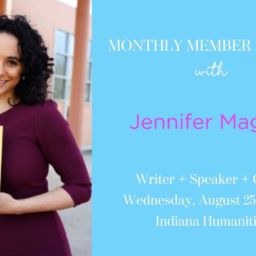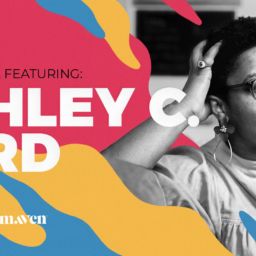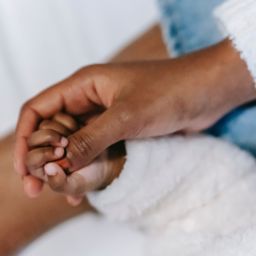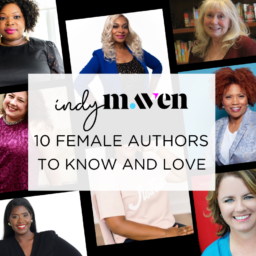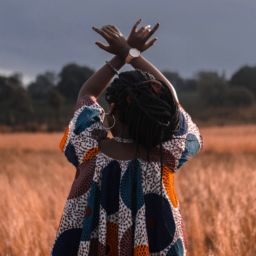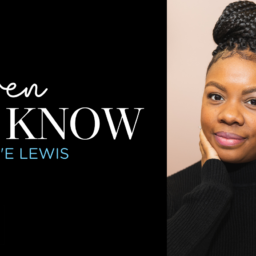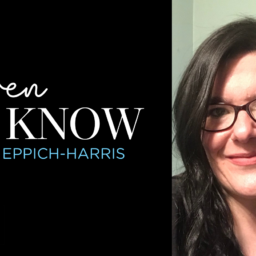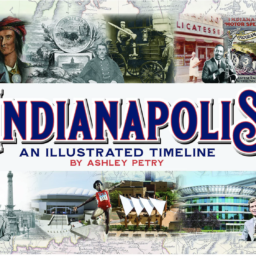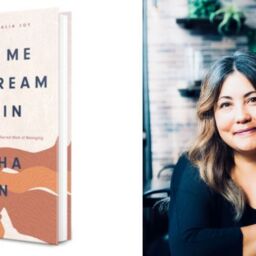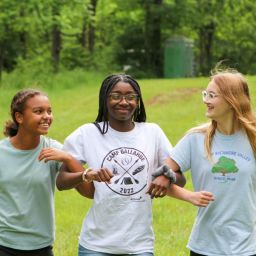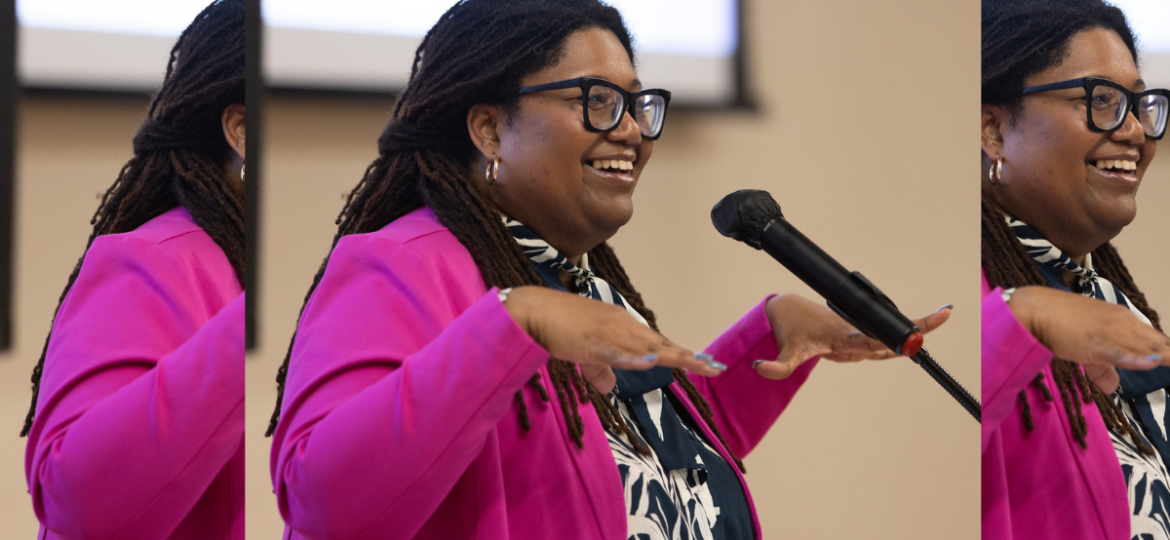
This article was created in partnership with Women’s Fund of Central Indiana.
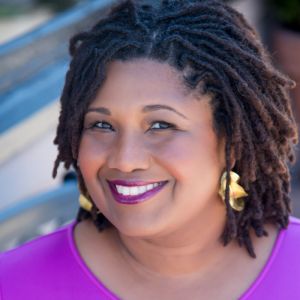 Tamara Winfrey-Harris is eating pizza, and I am in awe. Not of the pizza (though I too love a slice of Bazbeaux), but of the excitement and energy she brings to the boardroom table where nearly one dozen women sit in person and virtually via Zoom. They are non-profit leaders, philanthropists, and community organizers gathered to offer research support for a report the Women’s Fund of Central Indiana will publish later this year. The report will focus on the state of women and girls and inform how the organization will move forward to empower them through collective action.
Tamara Winfrey-Harris is eating pizza, and I am in awe. Not of the pizza (though I too love a slice of Bazbeaux), but of the excitement and energy she brings to the boardroom table where nearly one dozen women sit in person and virtually via Zoom. They are non-profit leaders, philanthropists, and community organizers gathered to offer research support for a report the Women’s Fund of Central Indiana will publish later this year. The report will focus on the state of women and girls and inform how the organization will move forward to empower them through collective action.
I share this with her a few weeks later as we begin the below interview and say it would be perfectly understandable that at the end of a long day, she’d have rather been eating pizza at home on the couch, but if that’s the case, Winfrey-Harris doesn’t show it. I can’t think of anyone better suited for the job as the Women’s Fund President. Read on to learn how the organization is evolving under Winfrey-Harris’ leadership, her third book to be released in July, and the legacy she’ll leave behind.
You’ve been in your role at Women’s Fund for about a year and a half now. How are you feeling?
“I feel really great. Your first year is so much learning about the organization, its history, meeting all of the people who are part of the Women’s Fund family. Luckily, I had been at CICF before so I had been in the Women’s Fund orbit. And because we got a chance to do strategic planning, last year was devoted to figuring out, ‘What do we need to be in the future?’”
Has there been anything about the job that surprised you?
“I was surprised at the number of people who just thought like Women’s Fund was just this idea in Indianapolis but it’s not, it’s all over the country. It’s an example of women coming together, realizing where there’s a gap where help is needed, and stepping into that gap.
Also, this is not to say that I didn’t know that there were amazing women in Women’s Funds orbit, but how much of a resource all of the women who are part of Women’s Fund are. I’m speaking a lot about our options alumnae of almost 500 women. It’s a reminder of when women come together, and we have common cause, how powerful we can be.”
What impact will the State of Women in Central Indiana report have?
“If you look at what is happening across the country and the low amount of philanthropic funding for women and girls specific issues—that 1.8% tells you all you need to know about how people think. I don’t think there is anything we are going to find out in that report that women and girls have not been saying. But unfortunately, people don’t tend to believe us when we talk about our lived experiences. I think there’s an opportunity, both with our report and the report that the Girl Coalition does, to call a thing a thing and really shape what our experience here is, what our experience in Central Indiana is, define it, hear it with data and community voice, and be able to say to people who make decisions. It’s an opportunity to define what we need people to pay attention to.”
Your third book, “A BLACK WOMAN’S GUIDE TO GETTING FREE,” comes out in July. How has your work as an author intersected with your role at the Women’s Fund?
“It’s rare in life when you get to combine your passions and your skills and this seemed like a once-in-a-lifetime opportunity. I talk a lot at Women’s Fund about looking at women through all of our identities. I wrote a lot about women and girls through the lens of race. But I had been wrestling with a lot of the same issues that we work with in Women’s Fund or that our grantees work with. I had been doing all of this discussion and writing and explanations about why women’s lives are like they are, and now I actually have an opportunity to actually work in and make change in that space. And that is super exciting.”
“If we can be vulnerable with each other, we can support each other, we’ll get free together.”
How did you decide this would be your next book?
“It’s sort of the answer to my first two books. In my first book, I wrote a lot about the negative stereotypes that follow Black women and girls and have followed us for centuries. In my second book, I asked women to write vulnerably to girls about managing those negative biases and how they’ve navigated those biases through their lives. And one of the things I say in the epilogue to “Dear Black Girl” is, ‘We will get free together.’ If we can be vulnerable with each other, we can support each other, we’ll get free together. Racism and sexism are not likely to go away in our lives. But we still have to find some kind of way to navigate and live authentically and have joy and live in the world. Black women are centered in my book, but I really think there’s something in it for anyone in a marginalized group, including other women.”
How do you think your role at Women’s Fund will shape your future writing?
“A lot of my writing is informed by my experiences and feminist theory. But when you start working in philanthropy and working closely with people who are doing the groundwork, looking at issues like reproductive justice or housing, or these complicated issues, it reminded me how hard some of this is, how hard some of these conversations are. Which was not a complete revelation, but it just reminds me of the complications, and that answers don’t come easily.
The other thing, it’s reminding me that women can do hard things. And when women take big chances, they often pay off. I see a lot of women who have founded their own not for profits because of something they experienced in their lives, and so now they want to make a change. It’s inspiring me to think, ‘What could I do differently with my writing that steps out of my comfort zone?’ I probably should not say this publicly but I really do want to try fiction. I’ve never published it before, and I’m pulled to do that.”
I’m sure you will knock it out of the park. You inspire so many women. Who or what inspires you?
“The first person I always have to say is my mom. Just watching her and how she carries herself professionally, in her community, and with us, as a wife and as a mom, is inspiring. There are lots of authors and feminists who are inspiring to my work and writing, like bell hooks and Audre Lorde. Then I look around at amazing women in the community, like yourself who have started their own thing, like Joy Mason, Carolene Mays—anytime I sit down and meet with someone I’m like, [women] are so cool. We are amazing. We could do this. That’s what gives me so much energy on this journey.”
When do you feel most yourself?
“When I’m in the company of women and specifically, my close girlfriends. I am so lucky to have a circle of amazing women. For my 50th birthday, I went with a group to Brown County and got a little cabin. There may have been some moonshine. We’re all writers so I was around women that I love, being inspired and just having fun. There were tears, laughter, shenanigans—it was amazing.”
Fast-forward to a day we hope never comes, but it’s your last day in this role at Women’s Fund. What legacy do you hope to leave behind there or in life?
“I’d like if the world could be better for women and girls. A stronger Women’s Fund that is sustainable in perpetuity to make sure that women and girls in Central Indiana never have to worry, that Indiana is a freer place for women and girls, especially those that are extra vulnerable, and that women and girls get to be joyful, and authentic, and safe, and happy, and that I’ve played some role in that.”
“Empowered girls become powerful women.”
On November 14, 1960, at the age of six, Ruby Bridges became the first African American child to attend the all-white William Frantz Elementary School in Louisiana. Nearly 64 years later to the day, on November 4, 2024, Ruby Bridges will speak at the Women’s Fund Power of Women event in Indianapolis. What can you share about that?
“The idea came from the awesome Nicole Wilson who is Board Chair of Women’s Fund, and the minute she said it I was like, ‘YES. That’s it.’ Ruby’s an amazing woman but it also speaks to the power of the girl. She’s six years old when she walks into that classroom—the strength. Someone in one of our meetings said, ‘Yes, because empowered girls become powerful women.’ I’m excited to hear her talk about her experience of being a girl and a young woman, and how she managed some really hard things. I hope that we can get a lot of youth in the room because I feel like this generation is having to deal with a lot of hard things so it will be very useful for them to hear from previous generations that have had to do the same, and how they came to be resilient, and how they made it through.”
Talk about like history coming alive. But it wasn’t that long ago.
“It’s a good reminder that some of the things we think of as ancient history—they’re not. We don’t want to create the same sins we just finished undoing. I’m going to go back to a question you asked me in the beginning because one of the things that I heard too many times when we were doing strategic planning and talking to groups of people was, ‘You bring speakers to Indianapolis, right?’ Because we have brought some amazing women to Indianapolis—Michelle Obama, the Duchess of Sussex, Billie Jean King, and now Ruby Bridges, but that’s not what we exist to do. Our mission is to convene, invest, and advocate so that everyone who identifies as a woman or a girl can reach their full potential in Central Indiana. That’s what we do. That is our purpose. Our once-a-year gala is very important to us both for fundraising and for the amazing women it exposes to the community. But make no mistake, we are here to make women’s and girls’ lives better.”
RELATED: Remembering Fannie Lou Hamer, Ida B. Wells, and Other Black Suffragettes
For more information about Women’s Fund of Central Indiana and The Power of Women Event, subscribe to their newsletter or visit www.womensfund.org.
Leslie Bailey is the co-founder and CEO of Indy Maven and an alumna of the Women’s Fund OPTIONS Program Class 22.
All of our content—including this article—is completely free. However, we’d love you to consider supporting our journalism with an Indy Maven membership.







